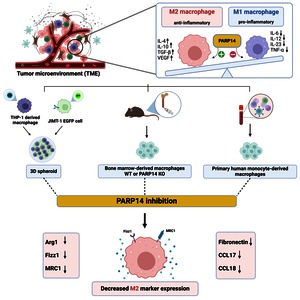Sturniolo, Isotta and Váróczy, Cs and Regdon, Zsolt and Türk-Mázló, Anett and Muzsai, Szabolcs and Bácsi, Attila and Intili, G and Hegedűs, Csaba and Boothby, MR and Holechek, J and Ferraris, Dana and Schüler, Hervig and Virág, László (2024) PARP14 contributes to the development of the tumor-associated macrophage phenotype. INTERNATIONAL JOURNAL OF MOLECULAR SCIENCES, 25 (7). No. 3601. ISSN 1661-6596
|
Text
PARP14ContributestotheDevelopmentoftheTumor-AssociatedMacrophagePhenotype.pdf - Published Version Available under License Creative Commons Attribution. Download (6MB) | Preview |
|
![[img]](https://real.mtak.hu/225412/7.hassmallThumbnailVersion/ijms-25-03601-ag.png)
|
Text
ijms-25-03601-ag.png - Published Version Available under License Creative Commons Attribution. Download (1MB) | Preview |
Abstract
Cancers reprogram macrophages (MΦs) to a tumor-growth-promoting TAM (tumor-associated MΦ) phenotype that is similar to the anti-inflammatory M2 phenotype. Poly(ADP-ribose) polymerase (PARP) enzymes regulate various aspects of MΦ biology, but their role in the development of TAM phenotype has not yet been investigated. Here, we show that the multispectral PARP inhibitor (PARPi) PJ34 and the PARP14 specific inhibitor MCD113 suppress the expression of M2 marker genes in IL-4-polarized primary murine MΦs, in THP-1 monocytic human MΦs, and in primary human monocyte-derived MΦs. MΦs isolated from PARP14 knockout mice showed a limited ability to differentiate to M2 cells. In a murine model of TAM polarization (4T1 breast carcinoma cell supernatant transfer to primary MΦs) and in a human TAM model (spheroids formed from JIMT-1 breast carcinoma cells and THP-1-MΦs), both PARPis and the PARP14 KO phenotype caused weaker TAM polarization. Increased JIMT-1 cell apoptosis in co-culture spheroids treated with PARPis suggested reduced functional TAM reprogramming. Protein profiling arrays identified lipocalin-2, macrophage migration inhibitory factor, and plasminogen activator inhibitor-1 as potential (ADP-ribosyl)ation-dependent mediators of TAM differentiation. Our data suggest that PARP14 inhibition might be a viable anticancer strategy with a potential to boost anticancer immune responses by reprogramming TAMs.
| Item Type: | Article |
|---|---|
| Uncontrolled Keywords: | macrophage; ADP-ribosylation; breast cancer; PARP14 |
| Subjects: | R Medicine / orvostudomány > R1 Medicine (General) / orvostudomány általában |
| SWORD Depositor: | MTMT SWORD |
| Depositing User: | MTMT SWORD |
| Date Deposited: | 25 Sep 2025 15:18 |
| Last Modified: | 25 Sep 2025 15:18 |
| URI: | https://real.mtak.hu/id/eprint/225412 |
Actions (login required)
 |
Edit Item |




